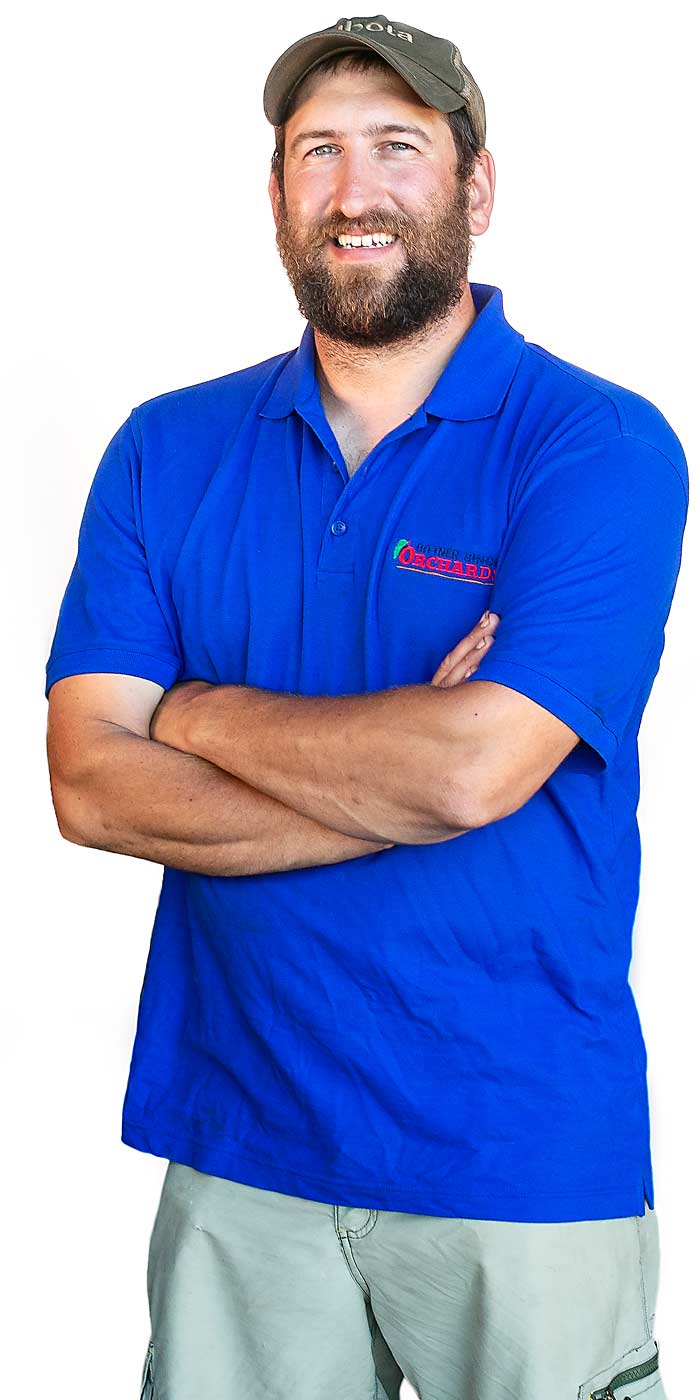family background / David is a second-generation farmer who grows fruit along Lake Ontario and who graduated with a degree in agriculture system management from Purdue University. He is the son of Margo and Jim Bittner.
age/34
grower/Appleton, New York
crops/Apples, cherries, stone fruit
business/Bittner-Singer Farms
How did you get your start?
My mom always tells a story that when I was a child, I said my favorite toy was dirt. I loved being outside and hated being in the house. It didn’t matter what the weather was, either – I’ve never been an indoor person.
The farm really lets me do what I want to do and have fun. I remember coming home from school, and if it was early enough, I got to work outside. If I got home from sports too late, I’d have to take a night off.
Working in the orchard, from mowing to spraying, I could see where I’ve been and what I’ve done. It was enjoyable being in the orchard. It’s really fun watching the crop grow and the orchard progress over the years. I don’t think I could work inside every day.
What led you to study agriculture?
I grew up a curious person. When the family would go out somewhere, Mom would have to check where I was because I’d be off doing something else. My whole family is made up of Cornell grads: I’m a Purdue grad — because I wanted to go somewhere else.
I didn’t want to make my decision just because my family went to Cornell. I looked at several college programs and even studied abroad for a while. I remember the day I figured out that I could get college credit and receive academic discounts to learn someplace else.
Why wouldn’t I take an opportunity to learn in New Zealand? I said, “OK, sign me up!” I took other opportunities too, such as working as a teaching assistant in precision agriculture. That class was an eye-opener, because I was never exposed to those concepts before.
What challenges are you working on?
We have a few new club apple varieties and new rootstocks coming up. I’m planning ahead and figuring out how we should be planting them. We’ve recently joined the Pazazz, RubyFrost and SnapDragon clubs.
That’s three new apple varieties we’re planting. We hope one or more will be a home run — or at least do really well compared to Gala and be closer to Honeycrisp in pricing. Alongside those changes, there are several varieties that are falling out of favor, such as Empire, Cortland, macs and Red Delicious, that we’re removing.
The prices for those older varieties are pretty sad, and it’s been quite a roller coaster choosing what varieties we want to replant with. Sometimes it feels like you’re playing with a Magic 8-Ball trying to figure out what to plant. Never mind all the work involved sorting out the patents, club availability, acreage spacing and all that.
What other things are you looking at for the future?
I love growing cherries, but we may not be able to in the future because of the pest pressure we’re having to deal with. I believe growing apples provides a good crop and I’ve been involved with them forever. One area that we are testing is with our first planting of table grapes.
In general, I’m always looking at other things to try or looking for niche markets that would complement what I’m already growing. Even though I’m keeping my eyes open for opportunities, I definitely believe I’ll be staying in fruit.
What fields of study should a young grower pursue?
A lot of people don’t realize how much science is involved in agriculture. We have plant pathologists, disease research and extension and more — all trying to figure out the best scientific methods to grow crops. One of our biggest holdups is when there are vacancies in research or extension.
Another growing area in agriculture is in technology, whether it’s keeping track of data, planting GPS, new sprayer control systems, CA controls — there are just so many things on the farm that are tied to technology. Farming is also a business.
To be successful you need to understand business, accounting, people management, legal. Having a general understanding of business would help someone who’s starting out.
What specialists do New York growers need?
Pest and disease expertise is a huge need because we have very few independent crop consultants left in New York.
Most of them are tied to chemical companies, which comes with its own pluses and minuses. The few experts who are independent are near retirement or have retired.
The other thing our growers could use is an increase in marketing knowledge. We’re competing against other regions, other crops and specialty products, and we need help standing out. If we can’t sell our crops, we’re not in business.
—TJ Mullinax







Leave A Comment